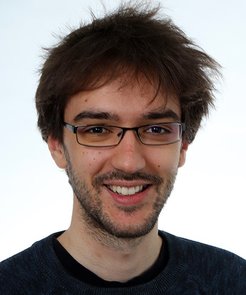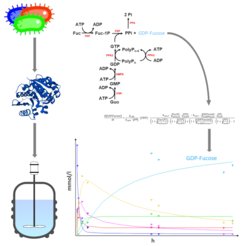Introducing one of our doctoral researchers: Nicolas Huber
Research focused on cell-free enzymatic cascades

Nicolas Huber, one of our IMPRS doctoral researchers, joined the IMPRS in January 2021. He joined the group of Dr Klamt because the training opportunities of the IMPRS program were exactly what he needed to solidify and deepen his understanding of the necessary theoretical background. His project is the theoretical part of a larger project. It includes the experimental work of Edgar Alberto Alcalá Orozco, another PhD student at the IMPRS. Since the IMPRS program seeks to facilitate scientific collaboration, this was a perfect fit for them.
His work is focused on the mathematical modelling and optimization of a certain kind of biochemical process: cell-free enzymatic cascades. These systems are usually created from a combination of various enzymes that are extracted from different organisms. Normally, the resulting enzyme network is artificial and cannot be found in nature. The label ‘cell-free’ derives from the fact that isolated and purified enzymes are used for the production process. This is different to traditional biotechnological production where whole cells are cultivated in bioreactors and these cells themselves are modified to enable the production of the compound of interest.
Alberto and Nicolas are working on several specific cell-free systems which are all set up to produce different nucleotide sugars. These compounds are combinations of sugar molecules connected to phosphorylated nucleotides. Nucleotide sugars can be thought of as ‘activated’ sugar molecules. They are the building blocks for larger oligosaccharides. There are many biotechnological and pharmaceutical applications, which require oligosaccharides of all kinds, so there is a demand for nucleotide sugars to be able to synthesize those oligosaccharides. One example would be the synthesis of human milk oligosaccharides (HMOs), which contribute to healthy infant development. Their production requires, among other things, exactly those nucleotide sugars that they are trying to create (GDP-Fucose, UDP-GalNAc, etc.). In the end, Nicolas and Alberto want to create optimized versions of their cell-free production networks with maximal titer (= product concentration), yield, and productivity, as well as minimal cost (and a plethora of other goals) since currently established production processes for many nucleotide sugars, are expensive and not very efficient.

In order to accomplish all of this, Nicolas is creating kinetic ODE (= ordinary differential equation) models of the cascades, which enable computer simulations of the system behaviour, namely how the concentrations of all metabolites that are involved in the cascade change over time. Then he is using the models to define and solve constrained optimization problems, which lead to predictions that can be tested in the lab. Alberto is testing his predictions to check if they can be validated and whether they lead to an improvement of the cascade. The data he is generating is also used to improve the model. Both of their work is a cycle of 1) theoretical modelling and optimization and 2) experimental data generation and testing of model predictions.
At first, Nicolas was a bit overwhelmed by trying to find time between his PhD work for gathering the mandatory credit points. But it all worked out and the additional training helped him a lot with his work. The main difficulty was figuring out how to combine his work hours at Magdeburg with his commute from and to Halle (Saale). Luckily, his supervisor was very understanding of his situation and they managed to find a good solution that works for both of them. Overall, he is very satisfied with the program since it facilitated his scientific cooperation with Alberto and its training opportunities supported his work. Additionally, the initial project plan and the regular PhD Advisory Committee (PAC) meetings help structure his PhD project.
Since Nicolas does not live in Magdeburg, he only knows some parts of the city from his commute to and from work and from occasional visits. Nevertheless, he likes how open and modern the city feels, especially with the new buildings around Alter Markt, while featuring many traces of its rich history like the Dom, the old fortifications at the Elbe, and the focus on the life and accomplishments of Otto von Guericke.
Last comment from Nicolas: “I want to thank everyone who’s putting time and energy into organising the IMPRS program. We PhD researchers benefit a lot from your work!”













